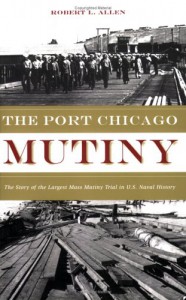One-sided but worth reading

I was actually completely unaware of the occurrence of the Port Chicago explosion or subsequent "mutiny", so this book was quite eye-opening.
I don't want to open this can of worms, but I think I have too: unfortunately this account is too focused on race and the individual, subjective experiences of the African American seamen who participated in the work stoppage. I say this because Allen has assembled a lot of damning information about Navy policies and actions that caused this explosion - and the successful blaming of the explosion on black sailors - but by focusing so much on the memories of a few participants and particularly Small's, and by focusing almost entirely on the issue of race, Allen has opened him up to charges of bias, no matter how unfounded. I am a big believer that the purpose of a book like this is to change the minds of people who might still believe the Navy's prosecution of the 50 "mutineers" was justified, but the way it is written that will never happen.
For me, the gold standard in exposing Naval institutional incompetence is All the Drowned Sailors, this book is nowhere near as rigorous, or thorough, or frankly compelling. I recognize what Allen was trying to do, but I think he would have been more successful in condemning the ass-covering actions of the Navy if he had approached the event as a story of institutional incompetence at multiple levels, rather than just a story of institutionalized racism.
I don't mean to say this book isn't any good: it is informative, thought-provoking, outrage-provoking and as complete coverage of this disaster as is out there, but I do think it could have been elevated to the status of classic had the race aspect merely been a part of a general indictment of human error in institutions rather than the raison d'etre of the whole book. And I think that allowing the Navy to indict itself via history would have probably been more effective than relying almost entirely on the memories of the survivors. (One of Allen's major problems is his reverential attitude towards the survivors he met, and his entirely sceptical attitude towards the official testimony of white officers; he should have reservations about all witness testimony in general.)
Still, if you have any interest in the history of disasters, the military or the navy, obvious miscarriages of justice, or the treatment of African Americans in the '40s, you should read this book. It's not perfect, but I know it's the best treatment of this terrible even out there.





